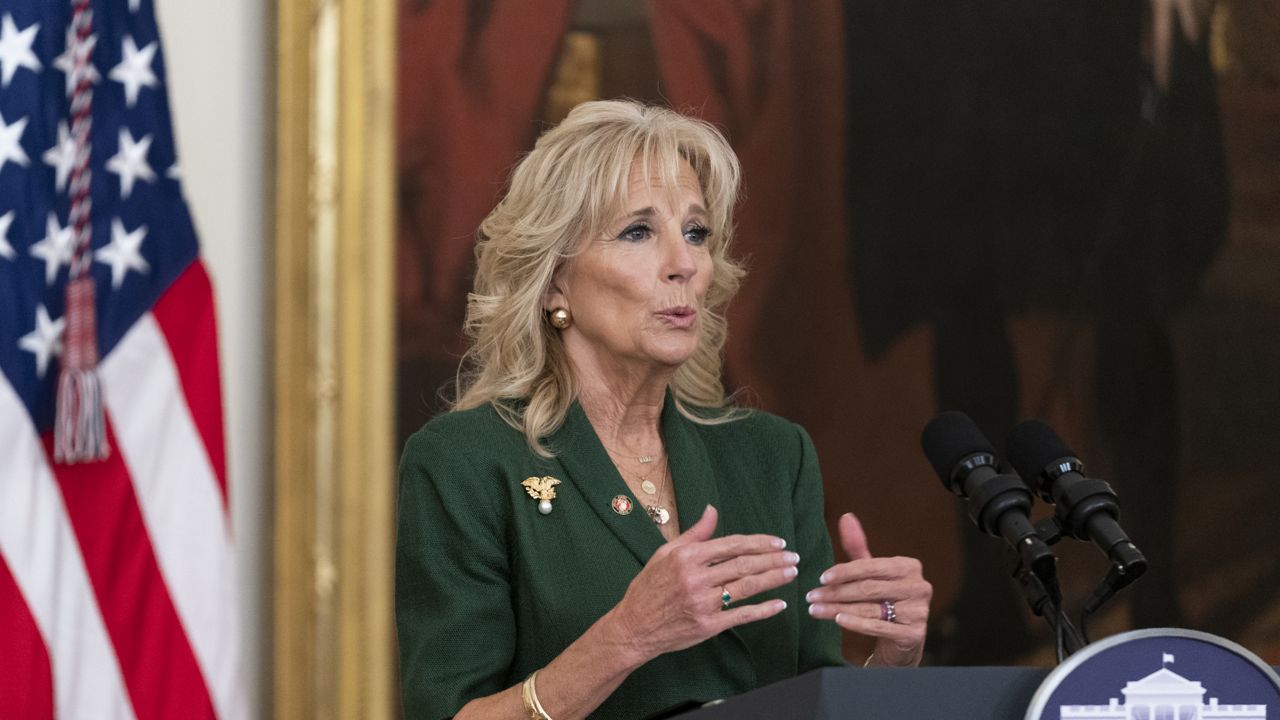Dr. Jill Biden has long worked to support members of the U.S. military and their families during her many years in Washington, and her time as first lady is no different.
On Wednesday, Dr. Biden joined lawmakers and members of her husband’s administration to highlight Hidden Helpers, an initiative that aims to “create supportive programming for the children of America’s 5.5 million military caregivers.”
The program is a joint partnership between the Elizabeth Dole Foundation, the Wounded Warriors Project and Dr. Biden’s own Joining Forces initiative, an effort the first lady started alongside Michelle Obama during Barack Obama’s presidency, and later revived at the outset of Joe Biden’s time in office.
Wednesday’s event, which was Dr. Biden’s first official ceremony in the East Room of the White House as first lady, included a speech from nine-year-old Gabby Rodriguez and her six-year-old sister, Ava. Gabby spoke of the responsibility she feels towards her father, who was left with a traumatic brain injury, partial hearing loss and post-traumatic stress disorder following an IED explosion during a tour of Iraq.
“My sister Ava and I are so excited to be here, and a little nervous,” Gabby began. “But we knew we needed to be brave and stand on this stage to let every caregiver kid know that they are not alone.”
Gabby has learned how to help when her dad has seizures, she said, although it’s difficult to watch heer father suffer.
“Being a caregiver can be tough, but we'll learn ways to help. My job is to give love and to bring light to my dad's day,” she said.
The first lady praised Gabby and Ava’s strength during her own address, saying they are among the over 2 million children nationwide who have been forced to grow up “in the shadow of 20 years of war.”
“We’re here to thank you for everything you do to help out at home — all the extra chores you take on or the times you watch your brothers and sisters,” Dr. Biden said to Ava, Gabby and four other children assembled at the White House. “We know you need a break sometimes — and that you need to be around kids and teachers who understand what you’re going through, without needing it explained.”
The Biden administration is making a number of actions to address the often unseen needs of military caregivers, with a particular focus on children of military families.
Through the first lady’s Joining Forces initiative, the administration created a Children in Caregiving Families cross-agency working group that will “produce a report outlining plans for future research and identifying areas of collaboration between agencies to better support military and veteran children in caregiving homes,” according to a statement from the White House.
The Department of Defense (DOD) and the Department of Veterans Affairs (VA) will also hold an “exploratory meeting” on ways the two departments can better support military families in transition periods. The VA is working alongside the Department of Education and Department of Health and Human Services to create a toolkit to help educators support children living in veteran or military households.
“Our military families make us a stronger, healthier and a more ready force,” Defense Secretary Lloyd Austin said Wednesday. “So we have to make sure that our phenomenal military families can not only survive the hard times, but they can actually thrive throughout their service.”
The new “Hidden Helpers” partnership aims to address many of the problems outlined in a recent report commissioned by the Elizabeth Dole Foundation, a first-of-its-kind look at the mental health impacts on child caregivers to military relatives.
The study, titled Hidden Helpers at the Frontlines of Caregiving: Supporting the Healthy Development of Children from Military and Veteran Caregiving Homes, was published Wednesday on mathematica.org. It found that around 2.3 million children under the age of 18 live with a disabled veteran, and said prior research indicated potential “negative outcomes for children growing up in military caregiving homes.”
The report detailed numerous increased challenges felt by children in caregiving homes, like higher rates of child behavioral problems, violence, or hostility. A 2020 study found that “higher rates of injury-related stressors … reported by the caregiver was associated with higher rates of child conduct problems.”
The report listed four key recommendations to better support military children and those they care for: The development of better early-intervention programs focused on per support and mental health; investing in support systems for the entire family unit; raising awareness for the issue through national campaigns and public-private partnerships, and decreasing barriers to health care on both the federal and local levels.
Wednesday’s ceremony previewed a number of initiatives stemming from the research, but was also a way for officials to thank military families for their own, often invisible, service.
“We’re here to honor the sacrifices you’ve made — the time you’ve missed with friends or moments you feel lonely because your family is different. And, most of all, we’re here to tell you that you aren’t ‘hidden’ any more,” Dr. Biden said. “But not only do we see you, we stand with you. And we are going to work to live up to the example of courage and duty that you set every day.”
